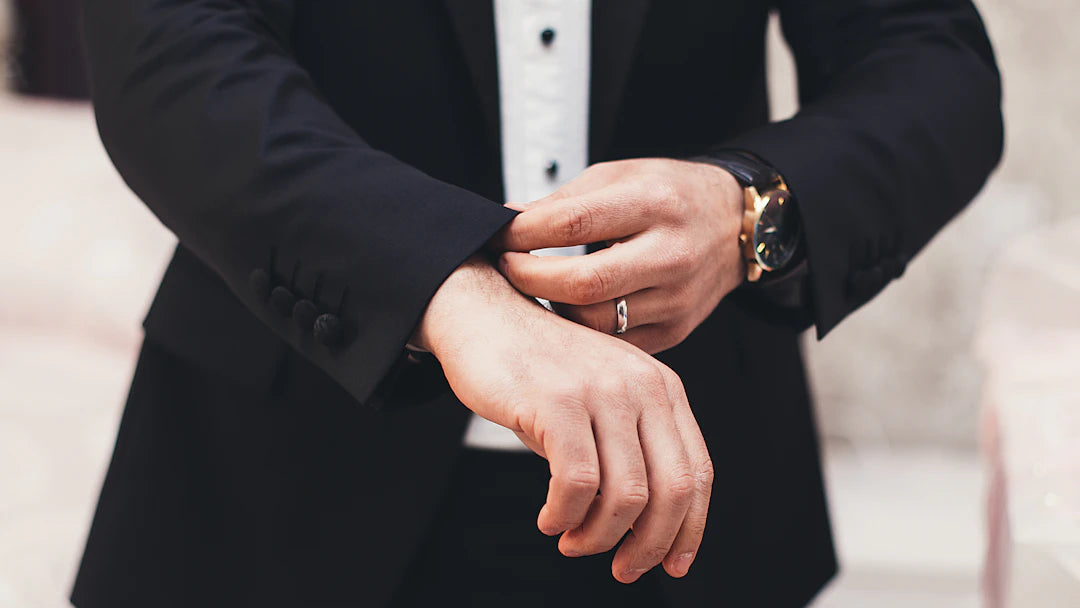Overview
This blog explores suit etiquette, emphasizing the importance of wearing a suit for professionalism and first impressions. It covers types of suits, occasions to wear them (like weddings and job interviews), when to skip them, and tips for accessorizing and ensuring a good fit. By mastering suit etiquette, you can enhance your personal style and confidence in various situations.
Frequently Asked Questions
1. What is the importance of wearing a suit?
2. When should you wear a suit?
3. What types of suits are available?
4. When is it appropriate to skip the suit?
5. How can you accessorize your suit effectively?
When it comes to dressing well, understanding suit etiquette is essential. Whether you're an aspiring professional or simply want to look your best at social events, knowing when to wear mens suits and when to opt for more casual attire can make a significant difference. In this guide, we'll explore the ins and outs of suit etiquette, including the different types of suits available, the occasions to wear them, and tips for looking your best. Let's dive in!
The Importance of Wearing a Suit
Wearing a suit is often associated with professionalism, respect, and confidence. A well-fitted suit can elevate your appearance significantly and give off an air of sophistication. However, not every occasion requires a suit, and wearing one inappropriately can feel out of place. Here are some crucial reasons why understanding suit etiquette is vital:
- First Impressions Matter: The adage "you never get a second chance to make a first impression" holds especially true in formal settings.
- Professionalism: In interviews and important meetings, a suit conveys that you take the occasion seriously.
- Versatility: Knowing how to dress appropriately for various occasions allows you to showcase your style and adapt to different environments.
Types of Suits: Understanding Your Options
Before delving into when to wear suits, it helps to understand the different types available. This knowledge could prove beneficial as you navigate formal events and daily attire challenges:
Mens Dress Suits
These suits are designed for formal occasions, such as weddings, galas, and business meetings. They are typically made from premium fabrics and come in classic colors like black, navy, and gray. Mens dress suits offer a polished look, making them a staple in any gentleman's wardrobe.
Mens 3 Piece Suits
The mens 3 piece suit is another stylish option, featuring a jacket, trousers, and a matching vest. This type of suit can add an extra layer of sophistication to your look, making it perfect for formal events or meetings. It can be dressed up with a tie or dressed down by removing the jacket.
Causal and Cheap Suits
Not all suits need to break the bank. Cheap suits are available that maintain style without compromising quality. Casual suits, often made from lighter materials, can be worn in less formal settings. They are suitable for outdoor events or evening gatherings where a full formal suit feels excessive.
When to Wear a Suit
Understanding the right occasions to wear a suit can enhance your experience in social and professional scenarios. Here’s a guide to when donning a suit is not only acceptable but advisable:
Weddings and Formal Events
Weddings typically call for mens formal suits. Depending on the dress code specified on the invitation, you can choose from a classic black tuxedo to a navy or gray dress suit. Pay attention to themes, as some couples may opt for specific color palettes or styles.
Job Interviews
Dressing appropriately for a job interview can determine your chances of success. A well-fitted suit, preferably a men's dress suit, signals professionalism and respect for the opportunity. Make sure to pair it with a compatible shirt and tie to complete the look.
Corporate Gatherings
Whether it's an annual meeting, conference, or an essential presentation, a suit should be your go-to attire. Corporate culture may dictate the style of suit—sometimes opting for a mens 3 piece suit adds an extra element of flair, while other times, a simple dress suit suffices.
Family Gatherings or Reunions
Although family gatherings are often more relaxed, certain occasions may call for a suit. For anniversaries, milestone birthday parties, or family reunions, wearing a suit shows respect for the event and those in attendance.
When to Skip the Suit
While suits have their places, there are numerous occasions where a more casual approach is appropriate. Here are some scenarios where skipping the suit may be the best option:
Casual Outings
Events like BBQs, picnics, or casual hangouts with friends don't typically require a suit. Instead, a smart-casual outfit can keep you comfortable while presenting a polished appearance. Opt for smart trousers and a well-fitted shirt, avoiding the formalities of a suit.
Weekend Errands
When you're running errands or taking care of household tasks, wearing a suit may feel out of place. Comfort and functionality should drive your wardrobe choices on weekends. Instead, consider wearing stylish casual attire that allows for ease of movement.
Outdoor or Active Events
Outdoor events like sporting outings, hikes, or active gatherings call for attire that allows for movement and comfort. These contexts do not typically lend themselves well to suit-wear, so opt for athletic or casual clothing suited to the activity.
Accessorizing Your Suit
The right accessories can truly elevate your suit and individualize your look. Here are some must-have accessories for the ideal suit ensemble:
- Ties: A complementing tie adds flair to your suit. Choose patterns or solid colors that align with the occasion.
- Cufflinks: For extra elegance, cufflinks pair beautifully with dress shirts, particularly in formal settings.
- Pocket Squares: This small detail can add a pop of color or pattern to your outfit, enhancing its overall appeal.
- Dress Shoes: When completing your suit, the right shoes matter. Leather dress shoes are the go-to choice, providing both sophistication and style.
Fit and Comfort: Key Considerations
Even the most expensive suit will look unprofessional if it doesn't fit well. Here are some tips to ensure that your suit is not only stylish but comfortable:
The Right Size
Ensure that your suit is the right size for your body type. A suit that is too tight or too loose can belittle its value. Many tailor shops offer services to adjust suits to attain the perfect fit.
Materials Matter
Choosing the right fabric can significantly impact your comfort level. Lighter materials, like cotton or linen, are ideal for hot weather, while wool suits are excellent for colder temperatures. Consider the season when selecting your suit.
Layers and Style
A mens 3 piece suit may offer versatility, allowing you to adjust your appearance based on the occasion. If you're too warm in your suit's jacket, feel free to remove it while keeping the vest and trousers for a sharp look.
Mastering the Suit Game
Once you've assessed suit etiquette, gained insights into when to wear a suit, and learned about the types available, you're well on your way to mastering the art of dressing right. Whether you're pursuing a career or attending a significant event, your attire reflects your personality, values, and respect for the occasion. Here are some final thoughts as you embark on your stylish journey:
- Practice Good Grooming: Regardless of the suit or occasion, ensure that you're well-groomed. Personal hygiene and styling can make all the difference in your appearance.
- Stay True to Your Style: While it's essential to adhere to suit etiquette, don’t forget to incorporate your unique style through accessories and personal touches.
- Invest in Quality: Quality suits often last longer and fit better than cheap suits. Consider investing in a few key pieces that can be used across various events.
By diving into suit etiquette, you'll be well-prepared to handle any formal or professional situation that comes your way! Choose your mens dress suits wisely, and remember that dressing well is a skill that will open doors and opportunities in your life. Embrace it and exude confidence, no matter the occasion!







